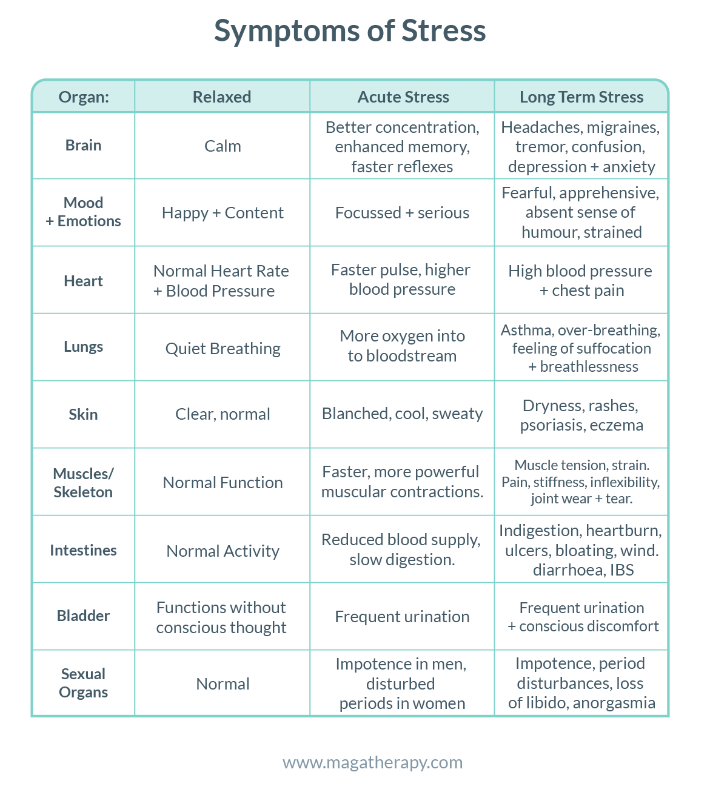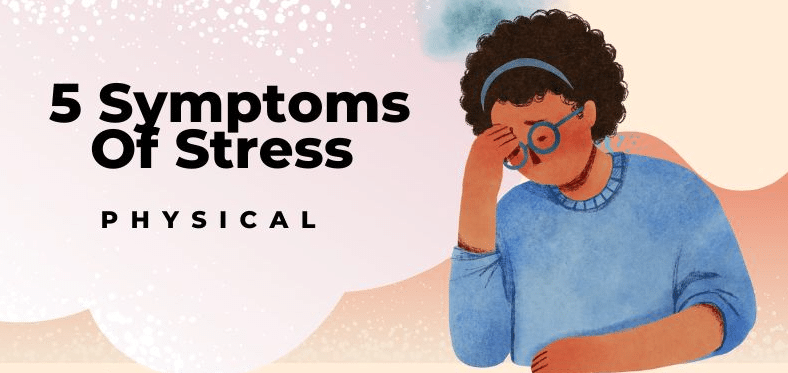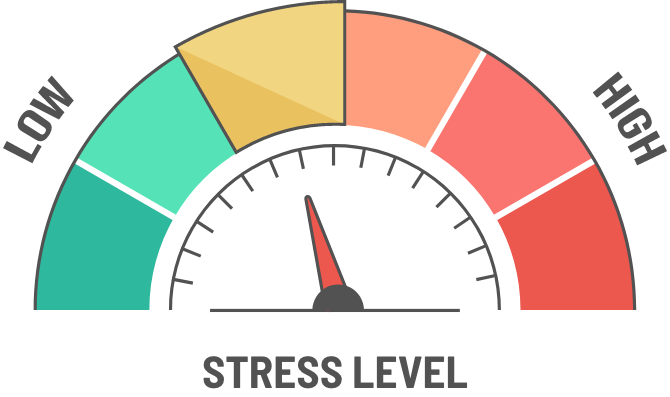What is Stress?
Despite stress being a commonly used word which describes feeling unwell or under pressure, few people understand stress or its many harmful effects.
Stress is tension, pressure and strain on the body in reaction to a threat or coercion (real or imaginary). It can be physical, mental, emotional or spiritual.
Stress is your body's way of telling you that it is not happy and that change is required. Protecting your mind and body from stress is one of the essential life lessons.Dawn Symons – Founder First Aid For Stress
All humans are subject to stress. And it isn’t always a bad thing. When you see someone, you love, for example, your heart thumps, and you get sweaty palms. That reaction is your body’s response to excitement (which we may perceive as stress).
On this page I cover the common physical symptoms of stress so that you can begin to self evaluate the level of stress you’re experiencing.If you want to go one step further try this quick stress test and get your stress score in minutes.
Common Symptoms of Stress
There are common symptoms of stress which can be broken down into physical and emotional symptoms.
Get your Stress Score Now
Physical Symptoms of Stress
Other Physical Symptoms of Stress To Look Out For
Chest pain or discomfort
- Dizziness
- Headaches
- Neck pain
- Nausea
- Numbness or tingling, particularly in your face
- Problems with digestion
- Shaking
- Sweating
2. Emotional Symptoms Of Stress
Stress can manifest in many ways.
- A tendency to work late and not take breaks.
- A tendency towards taking actions to ‘feel better’ – addictions healthy or otherwise often start or escalate at this point.
- Accident prone.
- Deceased productivity.
- Emotional fatigue.
- Frustration and anger.
- Forgetfulness/ confusion.
- Headaches.
- Indecisiveness.
- Irritability
- Impatience
- Lack of humor.
- Losing pride in your appearance.
- Nausea.
- Poor judgment or decision making.
- Sensitive with a tendency to take things personally.
- Tension, aches and pains.
These lists highlight the physical and emotional symptoms of stress however they do not offer any further information about the type of stress you might be experiencing.
There are different forms of stress and in the following section we will start to dive a little deeper and find out about these different forms of stress and also the symptoms associated with these forms.
Get your Stress Score Now
Different Types of Stress; Acute / Long Term / ACE / CUTS
Acute Stress
Acute stress is short-term stress, which occurs in response to an external stressor. For example, if you hear a loud noise, your body might release hormones to help you prepare for your fight or flight. Acute stress is not necessarily a bad thing. It helps us to be ready for potentially tricky situations.
Long Term / Chronic Stress
Chronic stress is a prolonged period of stressful situations (typically anything lasting more than six to eight weeks). You will be in a consistent state of heightened alertness. And the constant pressure on your body, mind and spirit can be very damaging if left unaddressed.
Adverse Childhood Experience(s) (ACE’s)
ACE’s are traumatic incidents that occur in childhood. It includes abuse or being raised in overly controlling conditions. ACE could cause on-going chemical imbalances that distort the way genes respond. It can make a person more susceptible to mental, physical and emotional health problems. It can also make a person more likely to become an addict and not achieve their full potential. Which, of course, creates its own stresses. Additionally, if not addressed, the child can re-enact overly controlling or abusive behaviour as an adult.
Chronic Unpredictable Trauma & Stress (CUTS)
CUTS develops in the same manner as Chronic stress. This could occur to someone who experienced ACEs as a child or who is in an intimate / work relationship with an emotionally abusive manipulator or someone who experienced ACEs in their younger years. CUTS create hypervigilance in the mind and body.
While short-term stress isn’t necessarily bad, excessive and consistent pressure can be highly detrimental to your physical and mental health. Operating under constant stress will cause your body to degenerate, weaken and buckle. It’s that simple!
The long-term elevation of stress hormones causes inflammation, which your system dutifully tackles. Stress is normal. However, the problem we all face is that our fight-or-flight response is not just activated by life-threatening events.
Anything and everything can act as a trigger. Once one occurs, you automatically experience a series of urgent internal chemical changes and messages to which your body responds accordingly. However, with your internal pedal to the floor, you experience physical and emotional strain. During which you are more susceptible to:
Burnout, Adrenal Fatigue, Burnout, Chronic Fatigue Syndrome/ME.Depression, Heart attacks, Nervous breakdowns, Panic attacks, Suicidal thoughts or attempts. There are also some studies showing prolonged stress could lead to some cancers.
So, how do we work out what form of stress we are experiencing? This table and infographic should help you to evaluate your physical symptoms against whether you are experiencing Acute or Long Term Stress.

The Development of Stress
There is a clear and defined domino effect from ‘normal’ stress into chronic, long-term stress. This was described by the Grandfather of Stress, endocrinologist Hans Selye, in 1936.
He said that the body’s response to stress followed an identifiable three-stage path, which he named General Adaptation Syndrome.
The three stages are Alarm, Resistance & Exhaustion. Below I have listed the main symptoms of stress experienced in each of these three stages.
Stage One: Alarm
This is the first response and takes place when a threat is perceived.In this stage, your fight-or-flight response is activated. Sensory data is collected and acted upon. Adrenaline is released and your body is on alert (known as the sympathetic response).
The following may also occur:
- Your pupils dilate, allowing more light to enter the eye. Distant vision is improved.
- Your hearing becomes acute.
- The heart beats harder and more rapidly.
- Blood flow to muscles and the lungs is enhanced. Breathing becomes more rapid.
- Larger muscles receive more oxygenated blood.
- The thyroid gland stimulates your metabolism.
- Your intestinal and urinary sphincters constrict. Digestion is reduced. You feel wired.
Stage Two: Resistance
According to Selye, Stage Two is when the body attempts to revert to its norm.
At this point, you will still be on high alert – but recovering.
The following is also normal:
- You are full of nervous ‘jittery’ energy.
- You continuously worry and expect the worst.
- You experience ‘brain fog’.
- You feel anxious and/or tense most of the time.
- You are short-tempered.
- You feel overwhelmed and overworked.
- You may increase your intake of tobacco, alcohol, prescribed or non-prescribed drugs and unhealthy foods.
- You are susceptible to viruses, colds and the flu.
- You take on too much, which means you are always rushing and often late.
- Your memory starts to fail.
- Your mind is in constant overdrive, even when you go to bed.
- Your blood sugar levels, pulse, blood pressure and respiration increase.
- You are likely to experience heartburn, diarrhea and/or constipation.
- You may get muscular tension. Shoulder, neck, back, jaw pain, headaches etc.
- You feel irritable, anxious, angry or down.
- You are susceptible to panic (anxiety) attacks.
- You feel wired and tired.
Top tip: During Stage Two, the ‘wired and tired’ stage, you may find 5-HTP, thiamine and B vitamins useful.
Stage Three: Exhaustion
The final stage, Exhaustion, occurs after prolonged stress.
It’s possible that you no longer have the ability to deal with stress.
Normal life can become incredibly tricky; you feel physically, emotionally and spiritually spent. You may also find:
Life feels like a total struggle, even normal activities such as rolling over and getting out of bed, expend more energy than you have.
Simple acts such as personal hygiene, preparing and eating snacks, and even communicating with others drains you completely.
Being determined, tenacious or stubborn does not help. Pushing back against your symptoms is counterproductive and subtly creates a delayed fatigue and recovery cycle.
You experience the escalation of severe low moods and/or depression.
Not being able to function as a ‘normal and productive’ human causes terrible emotional crashes, particularly as you appear to be healthy, capable or emotionally resilient.
At this stage you are vulnerable. An operation/ recovery, a traumatic experience, a severe virus such as the flu or covid-19 could tip you into the symptoms of M.E. (Myalgic Encephalomyelitis), Chronic Fatigue Syndrome (CFS), Long Covid or Post Virial Fatigue Syndrome (PVFS) or Fibromyalgia.
It is possible to identify much about the stress we are experiencing based on the physical and emotional symptoms. My intention for publishing this information is not to cause concern or worry, but to encourage you to take charge of your health and wellbeing. If you have identifed from this list, or from the stress test that you are experiencing an unhealthy level of stress, there is a lot you can do about that!
The First Aid For Stress website is a resource for you to use to get to understand your stress better so that you can start to take actions to heal yourself and become a happier, more balance version of you.
I created this resourse after learning how to heal myself from extreme, chronic stress and have a wealth of knoweldge to share with you. If you have not completed the stress test yet this is the next step. Get your stress score and I will send you my 6 Part Mini Heal From Stress Course For Free.




